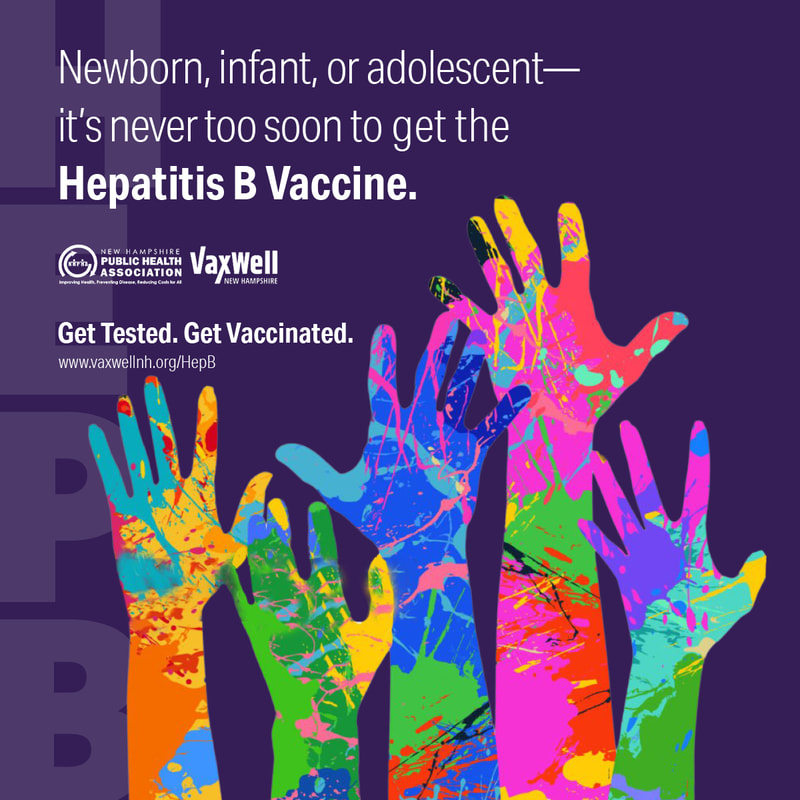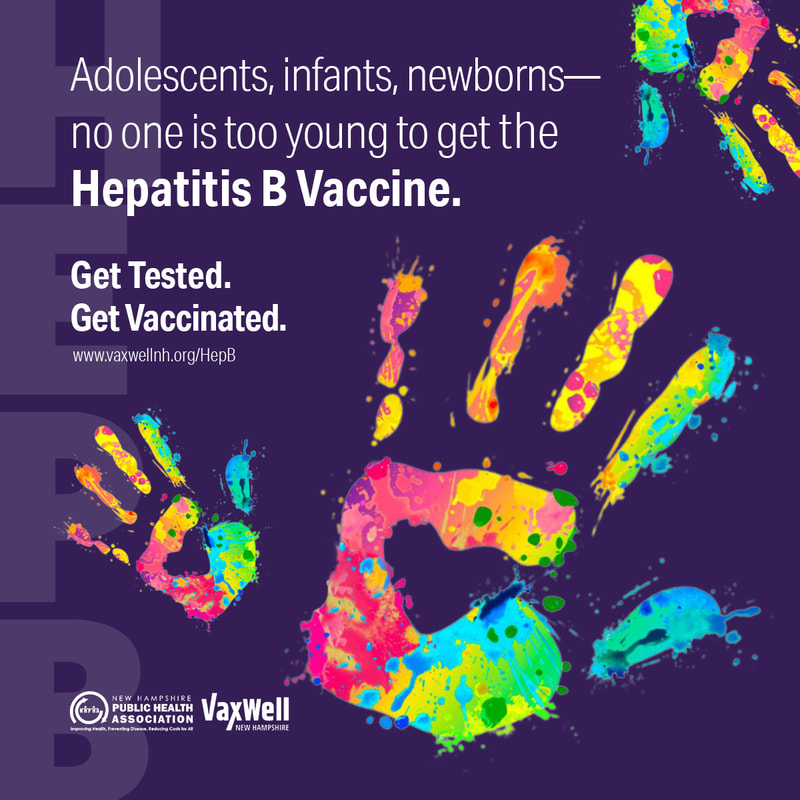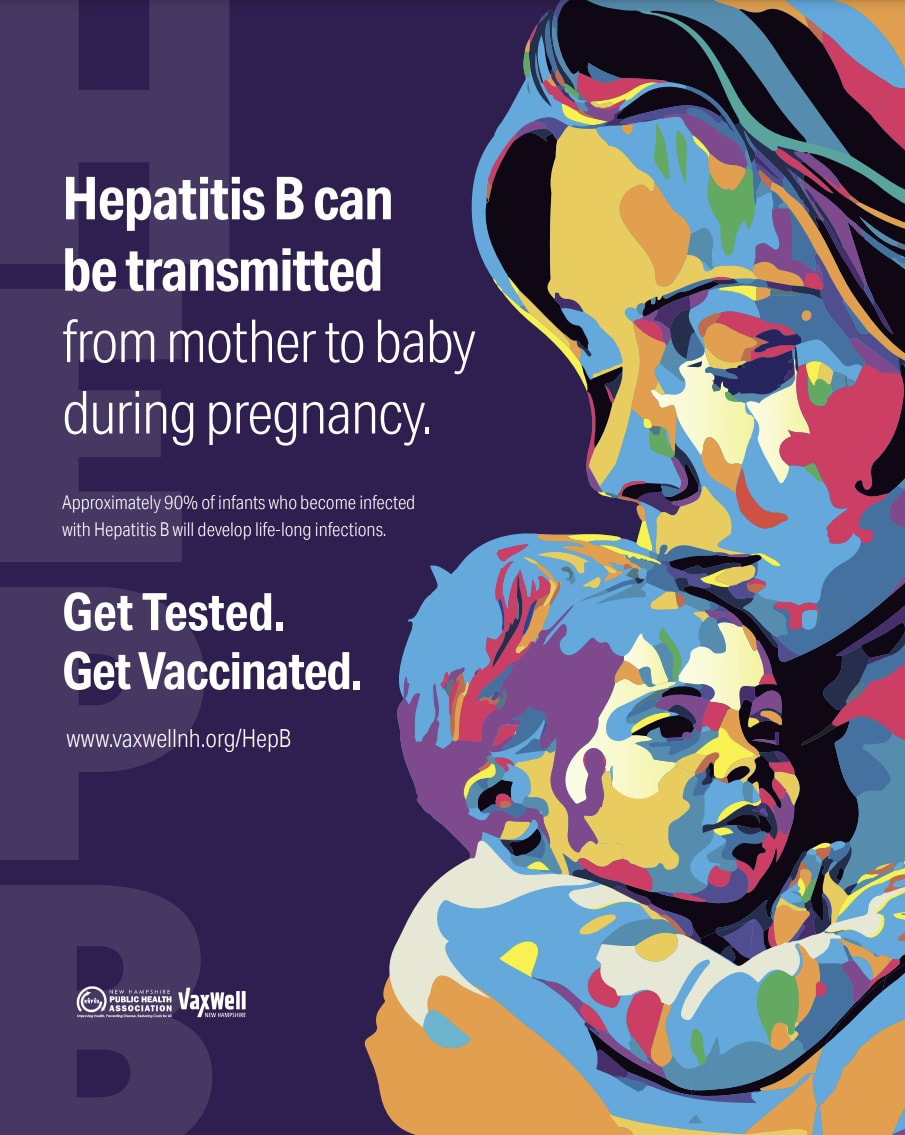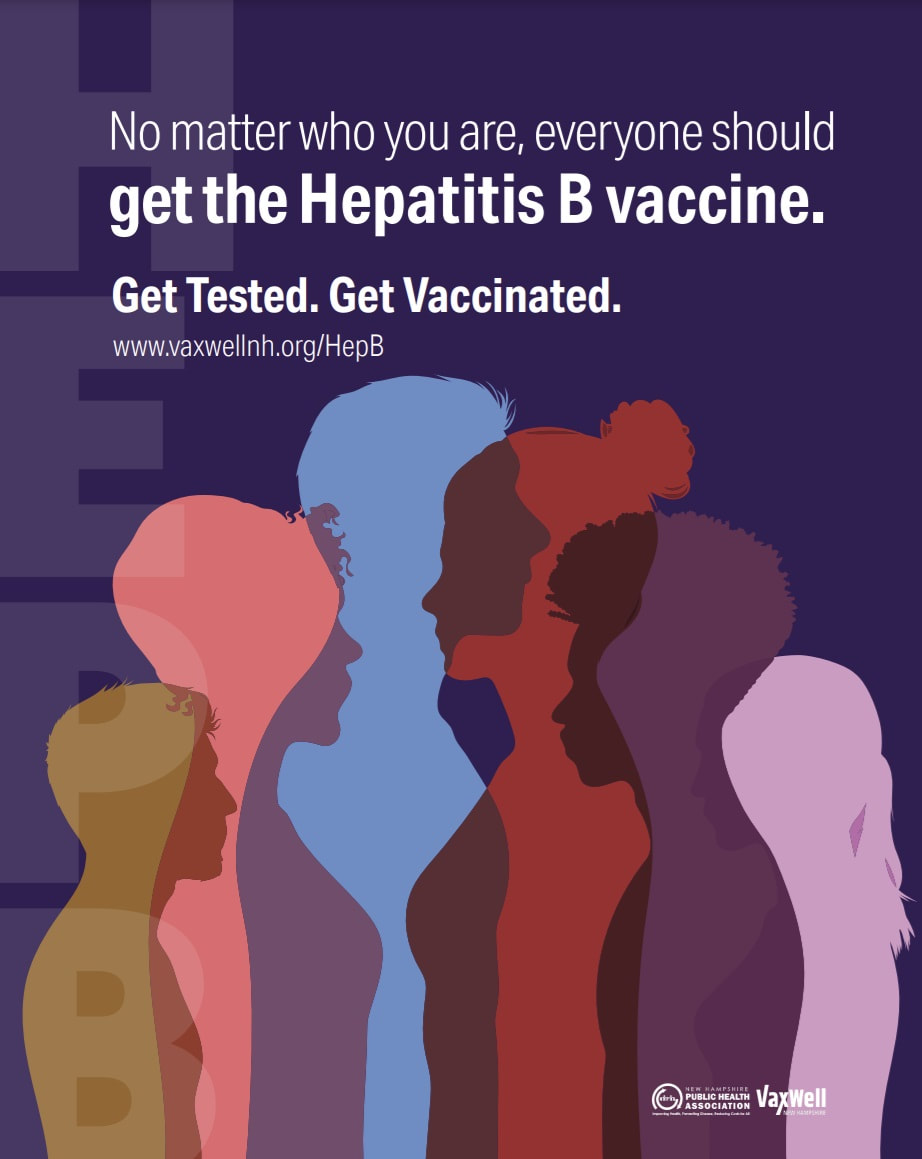Hepatitis B (HepB) Disease
Talking Points: Children
|
Social Media Messages: Children
|
| ||||||||||||
Hep B Campaign Posters
Request posters and NHPHA will deliver it to you.
Hepatitis B (HepB) Vaccine
Talking Points: Children
|
Background Information: Children
Excerpts from the following sources have been shared below. Please refer to them for further information:
Screening for Hepatitis B infection in pregnant people and infants
Clinical providers should screen all pregnant people for hepatitis B surface antigen (HBsAg) during each pregnancy, preferably in the first trimester, regardless of their vaccination status or history of testing. Pregnant people with a history of appropriately timed triple panel screening and without subsequent risk for exposure to Hepatitis B virus (HBV) (that is, no new HBV exposures since triple panel screening) only need HBsAg screening.
Clinicians should test all infants born to pregnant people who are HBsAg positive or have other evidence of HBV infection for HBsAg and anti-HBs seromarkers, at 9-12 months of age or 1-2 months after vaccine series completion if the series is delayed.
For additional guidance on screening and testing specific populations (e.g., patients on dialysis, perinatally exposed infants, and people exposed to HBV), visit https://www.cdc.gov/hepatitis/hbv/hbvfaq.htm#D4.
Vaccine Recommendations
Hepatitis B (HepB) vaccination is recommended for all infants who weigh at least 2,000 grams within 24 hours of birth, followed by completion of the vaccine series. Infants who weigh less than 2,000 grams at birth are recommended to receive 1 dose of the HepB vaccine at the chronological age of 1 month or at the time of discharge from the hospital (whichever occurs earlier and even if the infant’s weight is still below 2,000 grams).
Vaccines and Vaccine Schedules
Several HepB vaccines are available; some are single-component, and others are combination vaccine products. Some are licensed for only certain age groups. For details on HepB vaccine products, dosing amounts and more, please follow the table from the CDC at: https://www.cdc.gov/hepatitis/hbv/hbvfaq.htm#D4.
Infant Vaccination
Only single-component vaccines should be used for the birth dose and doses administered before age 6 weeks. Combination vaccine products may be administered after 6 weeks of age.
For vaccination schedule details, visit the HepB vaccine schedule.
Assessing Hepatitis B Status of Pregnant People and Management of Infants
All pregnant people should be screened for HBV, and postexposure prophylaxis guidelines should be followed for all infants based on the seropositivity of the pregnant person. For details on screening and further management of infants based on the seropositivity of the pregnant person, please visit:
CDC: Prevention of HBV Infection in the U.S., Recommendations of the ACIP.
Contraindications and Precautions
Like other vaccines, a history of a severe allergic reaction (anaphylaxis) to a vaccine component or following a prior dose is a contraindication to receiving further doses. Moderate or severe acute illness (with or without fever) in a patient is considered a precaution to vaccination, although persons with minor illness may be vaccinated.
HepB vaccination is contraindicated for persons with a history of hypersensitivity to yeast or any other vaccine component.
Some presentations of HepB vaccines contain latex, which may cause allergic reactions.
Vaccination is not contraindicated in persons with a history of multiple sclerosis, Guillain-Barré syndrome, autoimmune disease (e.g., systemic lupus erythematosis or rheumatoid arthritis) or other chronic diseases.
Additional details regarding contraindications and precautions for Hepatitis B vaccination may be found here.
Vaccine safety and efficacy
(excerpts from The Pink Book, The Epidemiology and Prevention of Vaccine-Preventable Diseases, Hepatitis B Chapter)
Over 90% of infants, children, adolescents, and healthy adults younger than 40 years old develop a protective antibody response after completing the HepB vaccine series.
Available data show that vaccine-induced antibody levels decline with time. However, immune memory remains intact for more than 30 years following immunization, and both adults and children with declining antibody levels are still protected against significant HBV infection (i.e., clinical disease, HBsAg antigenemia, or significant elevation of liver enzymes). Exposure to HBV results in an anamnestic anti-HBs response that prevents clinically significant HBV infection.”
NOTE (Dialysis Patients): Larger vaccine doses (2 to 4 times the usual adult dose) or an increased number of doses are required to induce protective antibodies in most dialysis patients 20 years or older and may also be necessary for other immunocompromised persons 20 years or older. The recommended vaccine dosage differs depending on the recipient’s age and type of vaccine.
Booster vaccine doses are not recommended for adults and children with normal immune status.
Routinely performing serologic tests to assess the immune status of vaccinated persons is not recommended. However, for dialysis patients who did respond to the vaccine, the need for booster doses should be assessed by annual testing of vaccine recipients for antibody levels, and a booster dose should be provided when antibody levels decline below 10 mIU/mL.
The most common adverse events following HepB vaccination that were noted in clinical trials included injection site reactions and mild systemic reactions. Common reported mild adverse events from post-marketing data include pain (3% to 29%), erythema (3%), swelling (3%), fever (1% to 6%), and headache (3%).
Rarely, other illnesses have been reported after HepB vaccination, including Guillain-Barré syndrome, chronic fatigue syndrome, neurologic disorders (e.g., leukoencephalitis, optic neuritis, and transverse myelitis), rheumatoid arthritis, type 1 diabetes, and autoimmune disease. However, no causal association between those conditions or any other chronic illness and HepB vaccine has been demonstrated. Reviews by scientific panels have also found no causal association between HepB vaccination and multiple sclerosis.
- CDC: HepB vaccination of infants, children, and adolescents
- The Pink Book, The Epidemiology and Prevention of Vaccine-Preventable Diseases, Hepatitis B Chapter
- CDC: Child and Adolescent Immunization Schedules
Screening for Hepatitis B infection in pregnant people and infants
Clinical providers should screen all pregnant people for hepatitis B surface antigen (HBsAg) during each pregnancy, preferably in the first trimester, regardless of their vaccination status or history of testing. Pregnant people with a history of appropriately timed triple panel screening and without subsequent risk for exposure to Hepatitis B virus (HBV) (that is, no new HBV exposures since triple panel screening) only need HBsAg screening.
Clinicians should test all infants born to pregnant people who are HBsAg positive or have other evidence of HBV infection for HBsAg and anti-HBs seromarkers, at 9-12 months of age or 1-2 months after vaccine series completion if the series is delayed.
For additional guidance on screening and testing specific populations (e.g., patients on dialysis, perinatally exposed infants, and people exposed to HBV), visit https://www.cdc.gov/hepatitis/hbv/hbvfaq.htm#D4.
Vaccine Recommendations
Hepatitis B (HepB) vaccination is recommended for all infants who weigh at least 2,000 grams within 24 hours of birth, followed by completion of the vaccine series. Infants who weigh less than 2,000 grams at birth are recommended to receive 1 dose of the HepB vaccine at the chronological age of 1 month or at the time of discharge from the hospital (whichever occurs earlier and even if the infant’s weight is still below 2,000 grams).
Vaccines and Vaccine Schedules
Several HepB vaccines are available; some are single-component, and others are combination vaccine products. Some are licensed for only certain age groups. For details on HepB vaccine products, dosing amounts and more, please follow the table from the CDC at: https://www.cdc.gov/hepatitis/hbv/hbvfaq.htm#D4.
Infant Vaccination
Only single-component vaccines should be used for the birth dose and doses administered before age 6 weeks. Combination vaccine products may be administered after 6 weeks of age.
- The usual dosing schedule is 0, 1 through 2, and 6 through 18 months.
- The third HepB dose must be administered at least 8 weeks after the second dose and at least 16 weeks after the first dose. The minimum interval between the first and second doses is 4 weeks. The minimum age for dose 3 is 24 weeks.
- All older children and adolescents not previously vaccinated with the Hep B vaccine should be vaccinated according to the CDC recommended schedule.
For vaccination schedule details, visit the HepB vaccine schedule.
Assessing Hepatitis B Status of Pregnant People and Management of Infants
All pregnant people should be screened for HBV, and postexposure prophylaxis guidelines should be followed for all infants based on the seropositivity of the pregnant person. For details on screening and further management of infants based on the seropositivity of the pregnant person, please visit:
CDC: Prevention of HBV Infection in the U.S., Recommendations of the ACIP.
Contraindications and Precautions
Like other vaccines, a history of a severe allergic reaction (anaphylaxis) to a vaccine component or following a prior dose is a contraindication to receiving further doses. Moderate or severe acute illness (with or without fever) in a patient is considered a precaution to vaccination, although persons with minor illness may be vaccinated.
HepB vaccination is contraindicated for persons with a history of hypersensitivity to yeast or any other vaccine component.
Some presentations of HepB vaccines contain latex, which may cause allergic reactions.
Vaccination is not contraindicated in persons with a history of multiple sclerosis, Guillain-Barré syndrome, autoimmune disease (e.g., systemic lupus erythematosis or rheumatoid arthritis) or other chronic diseases.
Additional details regarding contraindications and precautions for Hepatitis B vaccination may be found here.
Vaccine safety and efficacy
(excerpts from The Pink Book, The Epidemiology and Prevention of Vaccine-Preventable Diseases, Hepatitis B Chapter)
Over 90% of infants, children, adolescents, and healthy adults younger than 40 years old develop a protective antibody response after completing the HepB vaccine series.
Available data show that vaccine-induced antibody levels decline with time. However, immune memory remains intact for more than 30 years following immunization, and both adults and children with declining antibody levels are still protected against significant HBV infection (i.e., clinical disease, HBsAg antigenemia, or significant elevation of liver enzymes). Exposure to HBV results in an anamnestic anti-HBs response that prevents clinically significant HBV infection.”
NOTE (Dialysis Patients): Larger vaccine doses (2 to 4 times the usual adult dose) or an increased number of doses are required to induce protective antibodies in most dialysis patients 20 years or older and may also be necessary for other immunocompromised persons 20 years or older. The recommended vaccine dosage differs depending on the recipient’s age and type of vaccine.
Booster vaccine doses are not recommended for adults and children with normal immune status.
Routinely performing serologic tests to assess the immune status of vaccinated persons is not recommended. However, for dialysis patients who did respond to the vaccine, the need for booster doses should be assessed by annual testing of vaccine recipients for antibody levels, and a booster dose should be provided when antibody levels decline below 10 mIU/mL.
The most common adverse events following HepB vaccination that were noted in clinical trials included injection site reactions and mild systemic reactions. Common reported mild adverse events from post-marketing data include pain (3% to 29%), erythema (3%), swelling (3%), fever (1% to 6%), and headache (3%).
Rarely, other illnesses have been reported after HepB vaccination, including Guillain-Barré syndrome, chronic fatigue syndrome, neurologic disorders (e.g., leukoencephalitis, optic neuritis, and transverse myelitis), rheumatoid arthritis, type 1 diabetes, and autoimmune disease. However, no causal association between those conditions or any other chronic illness and HepB vaccine has been demonstrated. Reviews by scientific panels have also found no causal association between HepB vaccination and multiple sclerosis.
Hepatitis B Resources
ACIP Updated Recommendations HepB Vaccine Adults, 2022: Universal Hepatitis B Vaccination in Adults Aged 19–59 Years: Updated Recommendations of the Advisory Committee on Immunization Practices — United States, 2022
ACIP Recommendations HepB Vaccine, 2018: Prevention of Hepatitis B Virus Infection in the United States: Recommendations of the Advisory Committee on Immunization Practices
CDC: Professional Resources
CDC: Patient Education Resources (HepB)
ACIP Recommendations HepB Vaccine, 2018: Prevention of Hepatitis B Virus Infection in the United States: Recommendations of the Advisory Committee on Immunization Practices
CDC: Professional Resources
CDC: Patient Education Resources (HepB)
|
VAXWELL NH COALITION
NEW HAMPSHIRE PUBLIC HEALTH ASSOCIATION (NHPHA) 4 Park Street, Ste 201 Concord, NH 03301 United States Email: info@nhpha.org |
(c) 2024 NHPHA. All Rights Reserved.






